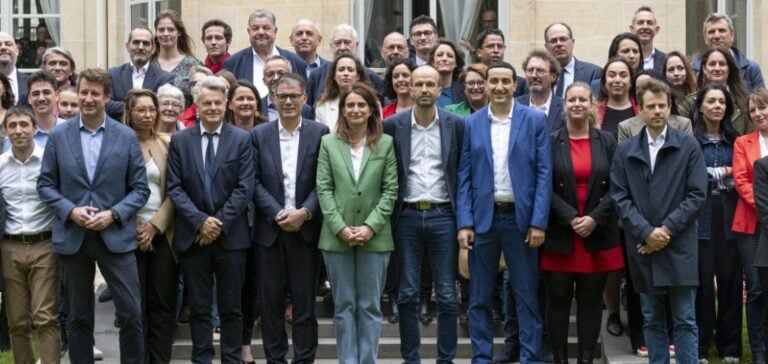The Nouveau Front Populaire (NFP) is proposing an energy shake-up for the 2024 French parliamentary elections, with measures marked by division on nuclear power but consensus on several key points. The coalition, recently formed for these elections, has distinguished itself with a particularly controversial energy program. Their proposals aim to radically transform the country’s energy landscape, with a focus on renewable energies and energy transition. The coalition brings together various left-wing parties, united by a common vision of environmental sustainability, but internal differences and the economic implications of their ideas are causing debate.
Division on the Nuclear Question
The left-wing coalition’s energy program avoids taking an explicit stance on nuclear power, reflecting differences within the left. The Socialist Party sees the atom as a “transitional energy” towards renewables, although this position is not unanimous among its members. France Insoumise and Les Écologistes are campaigning for a complete nuclear phase-out and a switch to 100% renewables by 2045, while opposing the construction of new EPR reactors even though parliament has passed a law to revive the sector in May 2023. On the other hand, the French Communist Party strongly supports nuclear power, seeing the atom as central to a strong public energy service. Thus, the only clear intention on which there is consensus within the alliance of left-wing parties is the desire to reverse the merger between the French Nuclear Safety Authority (ASN) and theInstitute for Radiation Protection and Nuclear Safety (IRSN), deemed dangerous for the safety of French nuclear power plants.
Consensus on Renewable Energies and Ecological Planning
Despite these divisions, there is consensus on a number of important measures. All agreed that banks should be forced to achieve “zero financing for fossil fuels”, with a particular focus on TotalEnergies’ oil projects. So, on this point, they support the directives put in place by the Macron government. There is also unanimous support for the development of renewable energies. The program aims to make France a European leader in marine energies, such as offshore wind and hydropower, and to strengthen renewable energy production in France and Europe.
In addition, the left-wing alliance is firmly opposed to the privatization of France’s hydroelectric dams, a measure currently underway under pressure from the European Union. The latter, in a bid to impose greater competition on the energy market, is pushing France to privatize these essential infrastructures. Privatization has already begun, with companies such as Engie, EDF and TotalEnergies holding significant stakes in the hydroelectric sector. Although the current government is keen to retain some control, it plans to privatize a large proportion of the dams. The NFP criticizes this approach, arguing that privatizing dams would jeopardize the public management of water and energy, and proposes keeping these infrastructures under public control to guarantee energy sovereignty and the protection of natural resources.
With regard to energy prices, the program pledges to “abolish” the 10% rise in electricity prices scheduled for February, and to “cancel” the 11.7% rise in gas prices scheduled for July. These measures are very popular, as the French are particularly concerned about rising energy costs.
Perspectives and Limits of the Energy Program of the New Popular Front
The NFP program has notable shortcomings in terms of sustainability. Too abrupt a transition to renewable energies would inevitably disrupt our energy supply. What’s more, despite the fact that the Socialist Party and the Communist Party support the use of nuclear power, some parties such as La France Insoumise (majority in the coalition) and Les Écologistes advocate a rapid nuclear phase-out. This goes against France’s policy of revitalizing civil nuclear power, which has been in force for several years. Nuclear power has always been a mainstay of France’s energy mix, generating around 40% of our electricity. Doing without this energy source would be extremely detrimental to our economy and domestic consumption.
What’s more, nuclear power is virtually non-polluting, and technological advances in this field are promising. Nuclear fission, in particular, could revolutionize the energy sector and be a major asset for our energy policy. Renewable energies, on the other hand, are not entirely reliable because they depend on weather conditions. To meet France’s annual electricity consumption of around 474 TWh using wind turbines alone, we would need to install around 237,000 wind turbines with an average capacity of 2 MW, each producing around 2 GWh per year. This estimate takes into account the fact that wind turbines do not operate at full capacity all the time, producing at full power for around 2,000 hours a year, so the left-wing coalition’s program seems unviable and of little benefit to the French economy.
The NFP’s energy program for the 2024 parliamentary elections is marked by a notable division on nuclear power, with positions ranging from support to a complete exit from this energy. Nevertheless, there is consensus on crucial points such as support for renewable energies, combating the financing of fossil fuels, and protecting consumers from rising energy prices. These measures reflect a desire to make the transition to greener, more affordable energy, while taking into account the different sensitivities within the coalition.






















